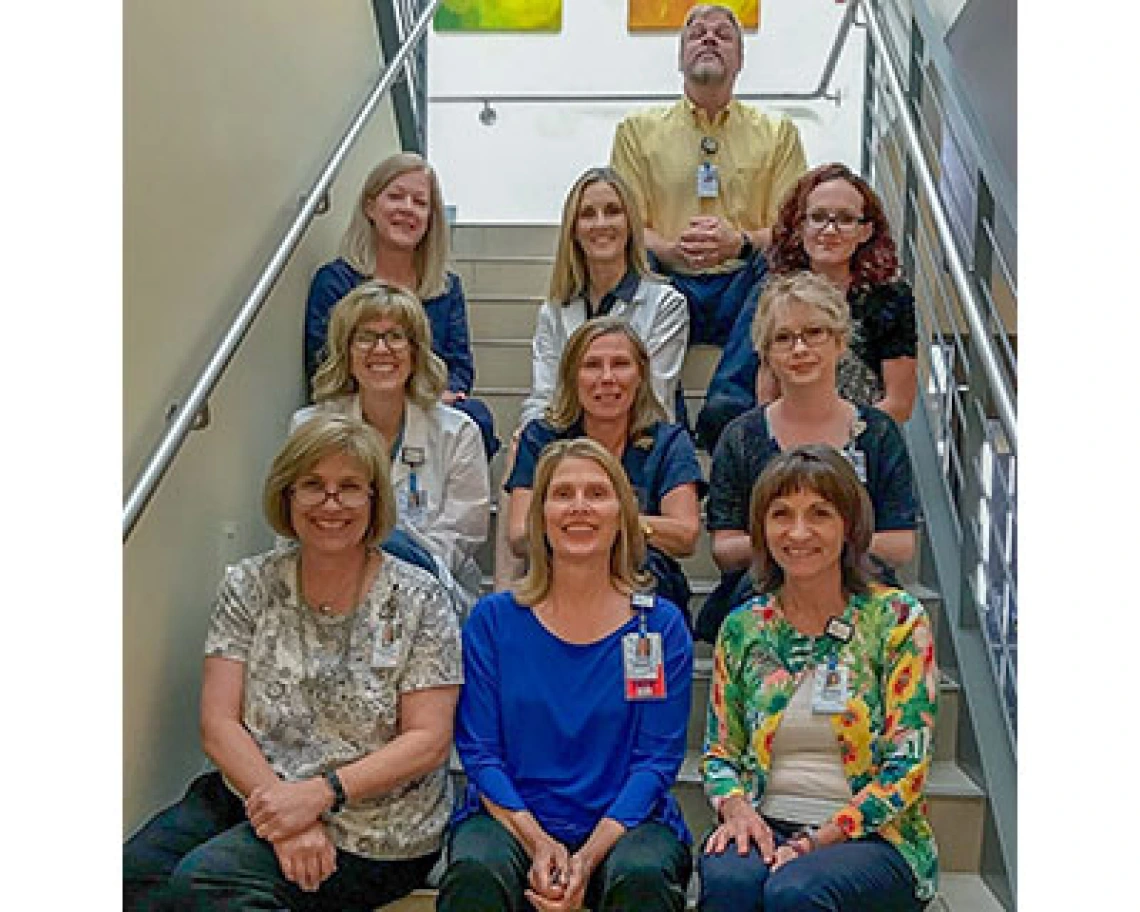With a Nurse in their Corner, ‘Navigating’ Care Is Getting Easier for Cancer Patients
Banner Health nurse navigators at the University of Arizona Cancer Center are paired with patients to guide them through their cancer journeys.

A cancer diagnosis can be overwhelming, sending new patients’ lives into a tailspin as they scramble to understand their disease, rearrange schedules and adjust future plans. During this difficult time, many patients could benefit from the guidance of an expert who knows every nook and cranny of the complicated cancer-care system.
In

UA Cancer Center nurse navigators (photo: Jacquelyne B. Echave)
“The concept of nurse navigators is new to Tucson,” said Beth High, MSN, RN, a Banner Health clinical program manager for navigation with the UA Cancer Center. “Although awareness is low, the value of a nurse navigator is sky high.”
All patients with cancer are assigned nurse navigators, who educate and advocate for them throughout their cancer journey. By connecting patients to support services to equip them to overcome barriers to care, such as transportation issues or financial difficulties, a navigator helps lighten the burden of “navigating” the system.
Shawn Mulligan, MS, BSN, RN, recently joined the team as a breast oncology navigator.
“As navigators, we’re like the hub of the wheel,” Mulligan said. “We’re a point person they can call for any reason, whether it’s billing, treatment or coordination of care. As a navigator, I can point them in the right direction and get their questions answered.”
Nurse navigation leaders are hard at work defining what they do and how best to do it. The UA Cancer Center has been selected as one of eight sites to participate in NAVmetricsTM, a first-of-its-kind national study that will help the Academy of Oncology Nurse & Patient Navigators (AONN+) test uniform standards to guide successful nurse navigation programs nationwide.
“Our selection was due to the strength of our metrics data,” High said. “We were one of the first centers to collect a year’s worth of data, which we started collecting in January 2017.”
Data from the NAVmetricsTMstudy will be used to establish “best practices” for navigation programs as they work to build their teams and improve patient outcomes. The study also will uncover roadblocks encountered by navigation programs as they work to implement these standards. In the future, navigation programs may be able to monitor themselves with metrics validated by the NAVmetricsTMstudy, enabling them to sustain their successes and shore up their weaknesses.
The UA Cancer Center’s navigation program has been several years in the making, and has grown into a source of pride.
“Our program started in the fall of 2015 when I was hired to be the breast navigator,” High said. “Since then, we have developed a program that has helped cement our excellent reputation, with 11 oncology nurse navigators going to bat for their patients.”
Each nurse navigator specializes in a disease type, equipping them to answer questions about a patient’s specific cancer diagnosis, including cancer survivorship.
“A cancer diagnosis can be so stressful it can be difficult for a patient to fully absorb all the information coming at them while fearing the unknown,” Mulligan said. “We can help them process this information in the context of this fear so they can make treatment decisions. As a breast cancer survivor myself, I may share my experience when appropriate. Sometimes my story restores hope for a patient, giving her the resolve to move forward.”
To make an appointment at the UA Cancer Center – North Campus, please call 520-694-CURE (2873). To make an appointment at the UA Cancer Center – Orange Grove campus, please call 520-742-4183.
The NAVmetricsTM study is a collaboration between AONN+, Chartis Oncology Solutions, LLC, and the American Cancer Society.
About the University of Arizona Cancer Center
The University of Arizona Cancer Center is the only National Cancer Institute-designated Comprehensive Cancer Center with headquarters in Arizona. The UA Cancer Center is supported by NCI Cancer Center Support Grant No. CA023074. With primary locations at the University of Arizona in Tucson and at Dignity Health St. Joseph’s Hospital and Medical Center in Phoenix, the UA Cancer Center has more than a dozen research and education offices throughout the state, with more than 300 physicians and scientists working together to prevent and cure cancer. For more information: uacc.arizona.edu (Follow us: Facebook | Twitter | YouTube)
About Banner – University Medical Center Tucson and South
Banner – University Medical Center Tucson, nationally ranked as a Best Hospital by U.S. News and World Report, and Banner – University Medical Center South, are part of Banner – University Medicine, a premier academic medical network. These institutions are academic medical centers for the University of Arizona College of Medicine – Tucson. Included on the two campuses are Diamond Children’s Medical Center and many specialty clinics. The two academic medical centers are part of Arizona-based Banner Health, one of the largest nonprofit health-care systems in the country, with 28 hospitals in six states: Arizona, California, Colorado, Nebraska, Nevada and Wyoming. For more information, visit BannerHealth.com/UniversityTucson or BannerHealth.com/UniversitySouth.

